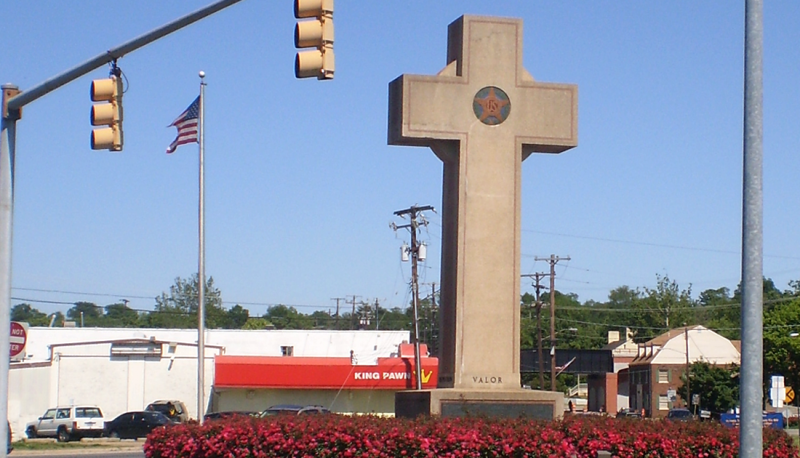On February 27, the Supreme Court is scheduled to hear oral arguments in The American Legion v. American Humanist Association and Maryland-National Capital Park and Planning Commission v. American Humanist Association, two cases challenging a veterans memorial cross that sits on government property in Bladensburg, Md. People For the American Way Foundation and allied organizations filed a friend-of-the-court brief on January 30 to make the case that the cross is unconstitutional. While we represent different issues and belief systems, we are united in the belief that the Bladensburg cross does not honor all of our veterans, as it disregards the diverse faiths and beliefs of those who have served and died for our country. Our brief’s introduction follows below. Click here to download a PDF copy of the full brief.
INTERESTS OF THE AMICI CURIAE
Amici are religious and civil rights organizations whose members include adherents to a wide array of faiths and beliefs that have historically been subjected to religious discrimination and official disfavor. Our differing belief systems notwithstanding, amici are united in respecting the important but distinct roles of religion and government in the life of our Nation. From the time of the founding, the Establishment Clause and the religious and philosophical ideals on which it is premised have protected religious freedom for all Americans by ensuring that government does not interfere in private matters of conscience.1
A governmental display of a Latin cross as a memorial to veterans is deeply hurtful and exclusionary to the countless non-Christians who have died in service to our Nation. Amici have strong interests in ensuring that equal sacrifices by our fellow citizens are treated with equal regard and that this Court’s jurisprudence remains true to the fundamental principles on which the Religion Clauses of the First Amendment are based.
The amici are:
- Americans United for Separation of Church and State.
- American Civil Liberties Union.
- American Civil Liberties Union of Maryland.
- Anti-Defamation League.
- Hadassah, the Women’s Zionist Organization of America, Inc.
- Hindu American Foundation.
- Interfaith Alliance Foundation.
- Jewish Social Policy Action Network.
- Men of Reform Judaism.
- National Council of Jewish Women.
- People For the American Way Foundation.
- Reconstructing Judaism.
- Reconstructionist Rabbinical Association.
- Union for Reform Judaism.
- Women of Reform Judaism.
Individual descriptions of the amici appear in the Appendix.
INTRODUCTION AND SUMMARY OF ARGUMENT
“The clearest command of the Establishment Clause is that one religious denomination cannot be officially preferred over another.” Larson v. Valente, 456 U.S. 228, 244 (1982); accord, e.g., McCreary County v. ACLU of Ky., 545 U.S. 844, 860 (2005) (government must remain “neutral[] between religion and religion, and between religion and nonreligion” (quoting Epperson v. Arkansas, 393 U.S. 97, 104 (1968)).
By ordaining that governmental and religious authorities operate in separate spheres, the Framers sought to safeguard religion from governmental influence and interference, so that all may worship and pray, or not, according to the dictates of individual conscience. And they undertook to quell the “hatred, disrespect, and even contempt” that historically has resulted “whenever government ha[s] allied itself with one particular form of religion.” Engel v. Vitale, 370 U.S. 421, 431 (1962). The First Amendment thus disallows official religious favoritism, no matter how modest or how benign in intent.
“The cross is of course the preeminent symbol of Christianity.” Salazar v. Buono, 559 U.S. 700, 725 (2010) (Alito, J., concurring in part and concurring in the judgment). For some Christians, contemplating a government-sponsored symbol of their faith may be a profoundly affirming experience. But for those who do not subscribe to Christian beliefs, being confronted with an official display of a Latin cross may be a profound experience in a quite different way.
For members of minority faiths, the towering Latin cross here conveys a strong message of exclusion and secondary status, whatever the counties’ intent. It announces that Bladensburg is a Christian polity, where Christians “are insiders, favored members of the political community,” and all others “are outsiders.” Santa Fe Indep. Sch. Dist. v. Doe, 530 U.S. 290, 309-310 (2000) (quoting Lynch v. Donnelly, 465 U.S. 668, 688 (1984) (O’Connor, J., concurring)). And the harm is all the greater because the counties proclaim the cross to be a memorial to all veterans, without regard to the countless non-Christians who fought and died for our country.
When government chooses, as it should, to honor those who have made the ultimate sacrifice for our Nation, it should recognize the equal citizenship and equal sacrifice of all. It should not favor only those who hold a preferred faith or set of beliefs.
This Court’s long-standing jurisprudence, which forbids such religious favoritism, appropriately safeguards religious freedom for all. As the United States becomes increasingly religiously diverse, that constitutional protection is more crucial than ever. The Court should therefore reject any invitation to forsake our “profound commitment to religious liberty” (McCreary, 545 U.S. at 884) and should instead reaffirm the fundamental principles and essential protections for religious freedom that have served this country and all its people so well for so long.
